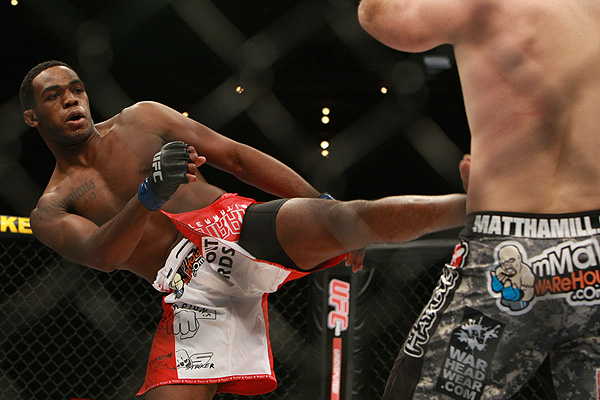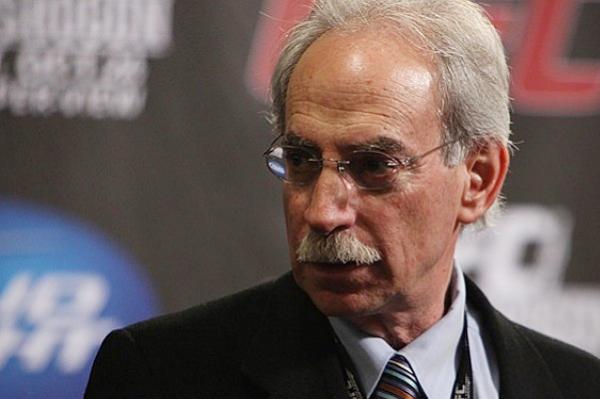MMA at 20: Martial Law
Pushing Forward

UFC
champion Jon Jones
hopes to someday compete in his home state. | Photo: Dave
Mandel/Sherdog.com
Ever since UFC 12 spurred a public and political backlash to MMA in New York, powerful enemies of the sport remained in the Empire State. Additional opponents flexed their muscles from outside the state, with the Nevada Culinary Union lobbying heavily against the sport in response to the non-union status of Station Casinos, which are controlled by UFC owners Lorenzo and Frank Fertitta. Despite the UFC’s heavy lobbying, it has been unable to get MMA regulated in New York for a major show at Madison Square Garden. In spite of the continued setbacks, Ratner remains confident that New York regulation will get done.
“Conservatively, I’ve been to Albany 17 or 18 times in the last four years,” Ratner said. “We’re a fighting company and we’re certainly not going to give up the fight. We have two world champions from the state of New York, with Chris Weidman and Jon Jones. It’s not a question of if; it’s a question of when. So I remain cautiously optimistic. It’s going to happen.”
Advertisement
The quality of MMA judging is a source of great debate within the sport. When a questionable decision is handed down, the Internet now regularly explodes with criticism. White and commentator Joe Rogan are two of the most prominent figures who regularly lambast the quality of judging, but those overseeing the judging argue the criticism is blown way out of proportion.
“I think MMA judging is in a very good state,” Nevada Athletic
Commission Executive Director Keith Kizer said. “I can’t agree on
every score, but it would be strange if you didn’t have
disagreements with at least a fight or two on every card. MMA
doesn’t have padded records like in boxing or non-conference
college basketball and football. MMA promoters make really close
fights, really good matchups. It’s rare in the UFC to have longer
than 3-to-1 odds. Closer fights mean more competitive and close
decisions than in Golden Boy or Top Rank. There are more
opportunities to disagree, but that doesn’t mean the officiating is
worse.”
With more fights than ever before and so many of them competitive, there are plenty of opportunities for criticism to arise. That still does not excuse the most inexplicable decisions, like a 2010 contest between Leonard Garcia and Nam Phan that seemingly everyone but Adalaide Byrd and Tony Weeks scored handily for Phan. Still, judges are often ripped for justifiable scores in close fights.
To ensure the highest quality of judging, many jurisdictions have extensive programs to groom potential judges. A prospective judge will begin by shadowing officials on smaller events. If they demonstrate competence and professionalism, they are given the opportunity to judge at smaller events. If they succeed there, they will eventually move up to bigger events. In addition, many states place a priority on the types of individuals given that opportunity in the first place.
“We’ve put an emphasis on your background in the sport,” Lembo said. “That really helps. If a judge or referee hasn’t been a fighter, it’s helpful that they’ve been a trainer or at least a participant. Keith Peterson, one of our referees, has a half dozen amateur MMA fights, 20 amateur kickboxing fights and has done a number of grappling tournaments. I think that helps. We’ve brought on [UFC veteran] Ricardo Almeida, as well. We don’t just insert boxing judges.”

Photo:
Dave Mandel/Sherdog.com
Ratner is a key cog in the UFC machine.
With limited turnover, veteran judges have an easier time than aspiring judges who may be of a higher quality.
MMA referees tend to have it easier in the court of public opinion. A few, most notably Steve Mazzagatti, face intense scrutiny in some circles.
For the most part, however, the most widely known referees like McCarthy and Herb Dean are given the benefit of the doubt and considered to be excellent officials.
The deference given MMA referees comes in part because fans recognize what a difficult job they have. Making split-second decisions to protect a fighter’s health is not an easy task, and MMA’s referees get it right more often than not.
“I think referee is just the toughest job,” Lembo said. “It’s easy to be critical, but at live speed, it’s so tough. I think it’s getting better. We’ve used something like 14 referees ever in New Jersey and we’re averaging 50 shows a year the last 10 years, so it’s a pretty limited pool; and those guys know what they’re doing.”
The delicate balance for referees is on giving a fighter every chance to win a bout while also looking out for his or her safety. Fighters are much more apt to react angrily to an early stoppage than a late one, but their safety is the foremost concern.
“I tell referees that you should never be criticized for stopping a fight too soon,” Kizer said. “You can stop it incorrectly, like if you thought he was out and he wasn’t out, but as far as stopping a fight from strikes and damage, you can never stop it too early. You can stop it too late but never too early. That’s the approach I take.”
As the sport continues to evolve, so, too, will its rules and regulations. However, for the next generation of regulators, judges and referees, the challenge will be finding the way to best enforce and perpetuate a system that has already been put in place. The hardest work has already been done: getting MMA from its state of infancy into a fully grown sport.






